North Korea: How real is Seoul's assassination threat?
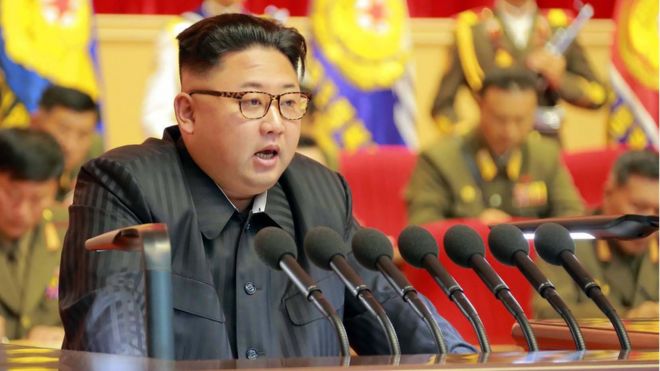 KCNA
KCNA
Reports that South Korea, in the wake of North Korea's dramatic 3 September test of a massive thermonuclear bomb, has approved plans to establish a special forces unit to assassinate Kim Jong-un appear to signal a sharp change of direction in the foreign policy of South Korea's President Moon Jae-in.
Why would a progressive politician elected in May on a platform of engagement with the North and who, just a few months ago in Berlin in July, talked confidently of establishing a "permanent peace regime" on the peninsula, of avoiding the "collapse" of North Korea and "easing its security and economic concerns", suddenly shift gears and appear to embrace aggressive regime change?
Seoul's leaders are terrified by the apparent failure of military deterrence, and the inability of Donald Trump, through his confident "fire and fury" rhetoric, to stop Pyongyang from pressing ahead rapidly with its aggressive military modernisation campaign.
More missile tests are a certainty and in the last day there have been reports of new activity at the North's nuclear testing facility at Punggye-ri that suggest a seventh nuclear test may be being prepared.
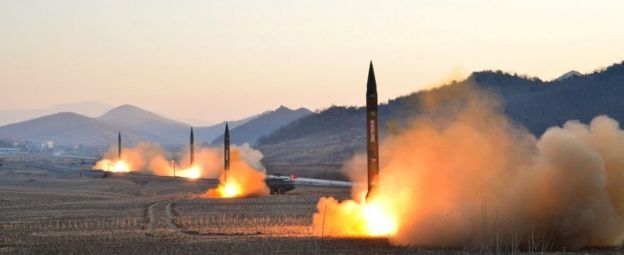 REUTERS
REUTERS
If the North finally and unambiguously becomes able accurately to deliver a long-range missile, armed with a powerful, miniaturised nuclear warhead, at an urban target in the continental United States, US planners will have, albeit reluctantly, to accept the need for military action on the Korean peninsula.
As Republican Senator Lindsay Graham has pointed out on a number of occasions (ostensibly channelling the thinking of Donald Trump), the US will have to risk exposing Seoul to massive civilian and military casualties in order to prevent the North from putting a US city in its strategic cross-hairs.
Only by scaring Mr Kim into believing his life may be in imminent danger can Seoul hope to offset this risk by persuading the North to pause its tests and engage in constructive dialogue.
But is the threat of decapitation a credible one and would it deter the North?
Paranoid leadership
In the past, the North's leaders have taken seriously the risk of being targeted.
In March 1993, for example, at a time of heightened US-North Korea tensions, Kim Jong-il, the father of Kim Jong-un, spent most of the month in a secure bunker, committed to a "semi-war" status while announcing the country's withdrawal from the nuclear non-proliferation treaty (NPT).
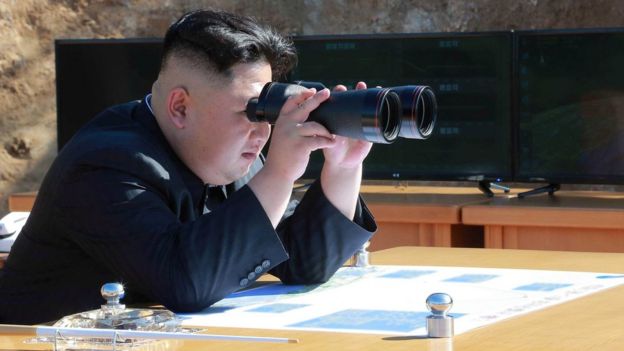 KCNA/REUTERS
KCNA/REUTERS
Fear of US escalation pushed Mr Kim into hiding but did not prevent the North from continuing to respond belligerently by violating international norms and abrogating past agreements.
The North also has a long history of creative adaptation in the face of foreign pressure. Fear of potential targeted strikes has encouraged a paranoid North Korean leadership, both past and present, to use dummy decoy vehicles and heavily circumscribed public appearances to minimise the risk of being caught in a surprise attack.
Just a few months ago in May, North Korea accused the US of instigating a CIA-coordinated plot to bribe a North Korean citizen to carry out a biochemical attack on Kim Jong-un.
It is impossible to corroborate these North Korean claims, which may amount simply to a propaganda gambit designed to deflect attention away from the North's own assassination plots, most notably the dramatic killing of Kim Jong-nam, Kim Jong-un's elder brother, apparently killed in February in Malaysia by North Korean operatives using a lethal VX nerve agent.
Given the fears and precautions of the North's leaders, a South Korean directed "hit" on Mr Kim would be highly risky and could easily degenerate into a Bay of Pigs scenario, comparable to the Kennedy administration's embarrassing failure to topple Cuba's Fidel Castro in 1961.
The South needs, therefore, to be especially cautious. A botched assassination attempt could easily provoke retaliation from the North in the form of limited military action that might in turn rapidly escalate unintentionally to a full-blown nuclear exchange.
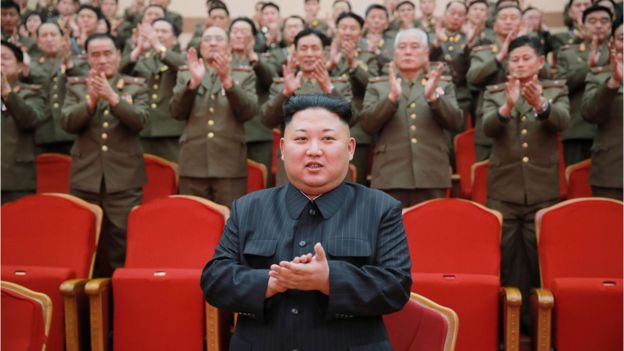 AFP
AFP
Policy makers in Seoul may be hoping to effect change indirectly.
By threatening Mr Kim directly, they may calculate that this will undermine support for the regime amongst political elites in Pyongyang who might be persuaded to launch a coup against the feared and brutal young leader. Recent high-level North Korean defector testimony suggests this scenario is highly unlikely.
As much as North Korean elites fear and resent Mr Kim, they are just as troubled by the threat to their security of rival groups within their own society. North Korea remains a highly stratified and class-conscious society.
The have-nots and those historically discriminated against in the North would, in the event of the removal of the leadership, rise up and seek retribution against the hyper privileged and favoured residents of Pyongyang.
Fear of being caught up in a destructive and bloody counter-revolution is likely to be sufficient to stay the hand of, or at least give pause to, anyone minded to take the perilous step of plotting against the leadership.
No good options
Decapitation then seems a high-risk strategy with a low chance of succeeding. Its value at this point is more declaratory than substantive.
The Moon administration may also hope that it may deflect increasingly vocal South Korean conservative demands for the country to acquire its own indigenous nuclear capabilities to offset the growing North Korean threat.
Notwithstanding recent positive remarks by the South Korean defence minister supporting the possible reintroduction of tactical nuclear weapons to the South, the government remains opposed to such a step, in part because it fears that this would spark a damaging and destabilising arms race in the region and further escalate tensions with the North, while increasing the risk of conflict arising through misperception and miscalculation.
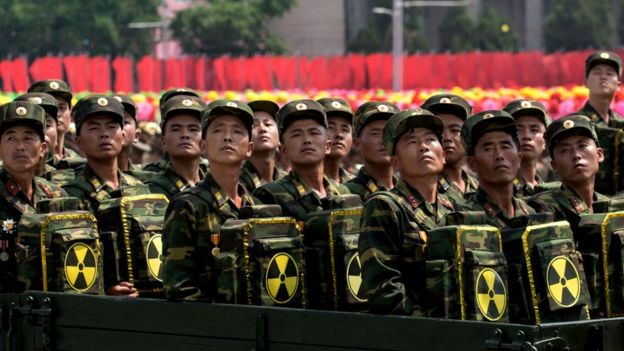 AFP
AFP
Ultimately, President Moon wishes to revisit the possibility of dialogue and engagement with the North, reaffirming in the process the constructive, diplomacy-centred approach of former Presidents Kim Dae-jung and Roh Moo-hyun.
To do this, he needs time to delay both the North's military modernisation campaign and the related tendency for Washington to see its policy options increasingly constrained and narrowed to the point at which the use of military force becomes the least unappealing among a number of distinctly unattractive options.
In an environment where there remain no good policy choices for dealing with the North Korean challenge, threatening decapitation may appear to be a viable card to play in an increasingly dangerous game of strategic poker.
Dr John Nilsson-Wright is a Senior Research Fellow for Northeast Asia, Asia Programme, Chatham House and Senior Lecturer in Japanese Politics and the International Relations of East Asia, University of Cambridge.







No comments
Post a Comment